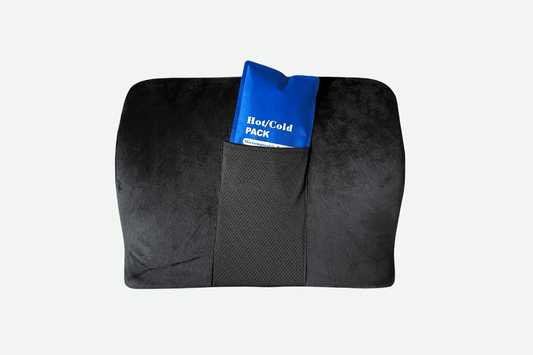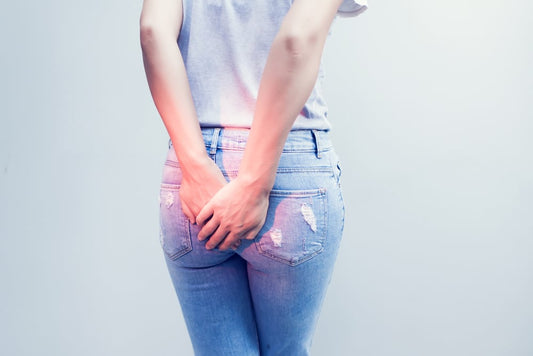Can Spicy Food Cause Hemorrhoids?
Robert Cutler, D.O., FAOCPrShare
We’ve all heard the old adage “you are what you eat”, but what does this mean for the spicy food lovers of the world? Are they forced to walk around red-faced like chili peppers and clutching their behinds, attempting to keep at bay the consequences of their meal? Is the itching, swelling and soreness of hemorrhoids a direct result of that daily hot sauce habit? Keep reading to learn how your diet can impact hemorrhoid health and whether spicy food can cause hemorrhoids.
What are Hemorrhoids?
Hemorrhoids are veins in your lower rectum and anus that largely go unnoticed until they are swollen. Once the veins have been irritated, symptoms can include pain, redness, itching and even bleeding. There are both internal and external hemorrhoids (small, purplish lumps on the skin around the anus), with the latter typically causing painful symptoms and the potential for prolapsed hemorrhoids (dilated blood vessels that protrude outside the anus from within).
A number of factors can cause hemorrhoids, including constipation or any sort of straining during bowel movements, obesity, age and sitting for long periods of time. As with many medical issues, diet and exercise habits can play a huge role in both preventing hemorrhoids or exacerbating symptoms. We’ll dive deeper into how the food you eat connects to hemorrhoid health and whether certain foods cause hemorrhoids. (Hot wings fans stay tuned, as we tell you whether spicy food is to blame for that pain in your behind.)
Do Spicy Food Cause Hemorrhoids? The Link Between the Two
Spicy foods don’t cause hemorrhoids, but before you load up that next plate of nachos, let’s further investigate the link between them.
The heat we feel from eating spicy foods is typically a result of capsaicin. This extract found in chili peppers has clinical benefits including pain relief, cancer prevention and weight loss when consumed in small amounts1. Ingesting larger quantities of capsaicin, however, poses a risk of gastrointestinal discomfort, including symptoms such as heartburn, diarrhea and other pain2.
While there is no research linking hemorrhoids from spicy food (capsaicin or otherwise) directly, we have plenty of evidence demonstrating what provokes pre-existing hemorrhoids or creates the conditions in which they will potentially appear. Consuming spicy foods with capsaicin produces the risk of higher abdominal pain and burning than standard meals3, and the side effects spicy foods cause are a red flag for hemorrhoids. So while spicy foods and hemorrhoids do not have a causal relationship, let’s further explore questions like: can spicy food cause hemorrhoids to bleed? And can spicy food irritate hemorrhoids?
Potential Indirect Effects on Hemorrhoids
As we mentioned, spicy foods will not form hemorrhoids. Diarrhea, constipation and excess pressure on your rectum are all proven causes of hemorrhoids though, and it’s hard to get around regularly consuming spicy food without running into some form of gastric distress.
If you are already suffering from hemorrhoid symptoms, active hemorrhoids and spicy food do not pair well. Inflammation, soreness and even bleeding can be aggravated by consuming spicy foods, which force an already struggling digestive system to work even harder, placing further strain on your hemorrhoids. Sore, cracked and bleeding skin around your anus from dealing with hemorrhoidal discomfort can come in contact with capsaicin contained in the exiting stool, causing a significantly unpleasant reaction both inside and out.
Precautions When Consuming Spicy Foods
Do spicy foods cause hemorrhoids? Not directly, but there are steps you can take now to ensure you can continue to eat your favorite dishes without putting your hemorrhoids in harm’s way. For anyone with preexisting conditions such as IBS or gastroenteritis, using moderation and monitoring your individual tolerance when consuming spicy food is always the best idea. Friends or family with similar conditions may be dousing their plates with sriracha, but paying attention to your own triggers and reactions is a great way to learn how to incorporate the spicy stuff into your daily life.
If your concern is missing out on flavor, there are plenty of alternative spices to help you beat the heat. Less spicy versions of ingredients that you associate with hotter dishes, such as sweet paprika (hot paprika contains capsaicin) or sumac (similar flavor profile) can be substituted for hot paprika, for instance.
It’s also worth experimenting with ingredients to find out if certain spices make your hemorrhoids symptomatic while other spices do not. Mustard seed, wasabi root, horseradish, sichuan and galangal root are all used to create heat in dishes (as well as the aforementioned capsaicin) and may have completely different effects on your body, gastric or otherwise. Experimenting and educating yourself in the kitchen is a powerful tool for balancing your brain’s flavor preferences with the rest of your body’s needs.
What Foods Cause Hemorrhoid Flare-Ups?
When your hemorrhoids flare-up, it’s tempting to place the blame on anything you’ve been eating that seems even the slightest bit suspicious. It is a common myth5 that spicy foods cause hemorrhoids, but as we’ve demonstrated, there is no medically sound research backing it up. So while you may be kicking yourself thinking that spicy food caused your hemorrhoids, remember: there are a number of other foods that could be the culprit.
The following is a list of items lurking in your diet known to cause hemorrhoids or increase the severity of symptoms6. These include:
- Dairy
- Processed foods
- Fast food
- Meat
- Salty foods
- Alcohol
- Caffeine
- Sugar
If you’re already dealing with hemorrhoid symptoms, avoiding foods that will prolong your suffering is always a good idea. Again, does spicy food cause hemorrhoids? No, but does spicy food make hemorrhoids worse? It can! It’s always helpful to eliminate anything that risks delaying your healing until your flare-up has passed, and in the meantime, use products to target the active hemorrhoid.
Other Dietary Considerations for Hemorrhoid Prevention and Relief
Remember, the flipside of dietary restrictions to help combat hemorrhoids is that your diet can also be used to prevent them from forming in the first place. Eating a high fiber diet that includes fruits, vegetables and whole grains keeps your stool soft and easy to pass. Drinking enough water helps stop constipation and reduces straining and pressure on your rectum.
Sources
- Srinivasan K. (2016). Biological Activities of Red Pepper (Capsicum annuum) and Its Pungent Principle Capsaicin: A Review. Critical reviews in food science and nutrition, 56(9), 1488–1500. https://doi.org/10.1080/10408398.2013.772090
- Xiang, Q., Tang, X., Cui, S., Zhang, Q., Liu, X., Zhao, J., Zhang, H., Mao, B., & Chen, W. (2022). Capsaicin, the Spicy Ingredient of Chili Peppers: Effects on Gastrointestinal Tract and Composition of Gut Microbiota at Various Dosages. Foods (Basel, Switzerland), 11(5), 686. https://doi.org/10.3390/foods11050686
- Aniwan, S., & Gonlachanvit, S. (2014). Effects of Chili Treatment on Gastrointestinal and Rectal Sensation in Diarrhea-predominant Irritable Bowel Syndrome: A Randomized, Double-blinded, Crossover Study. Journal of neurogastroenterology and motility, 20(3), 400–406. https://doi.org/10.5056/jnm14022
- U.S. Department of Health and Human Services. (2016, October). Symptoms & causes of hemorrhoids. National Institute of Diabetes and Digestive and Kidney Diseases. https://shorturl.at/isHTU
- Altomare, D. F., Rinaldi, M., La Torre, F., Scardigno, D., Roveran, A., Canuti, S., Morea, G., & Spazzafumo, L. (2006). Red hot chili pepper and hemorrhoids: the explosion of a myth: results of a prospective, randomized, placebo-controlled, crossover trial. Diseases of the colon and rectum, 49(7), 1018–1023. https://doi.org/10.1007/s10350-006-0532-3
- Eating, Diet, & Nutrition for Hemorrhoids. (2022, July 23). National Institute of Diabetes and Digestive and Kidney Diseases. https://shorturl.at/hlW46


